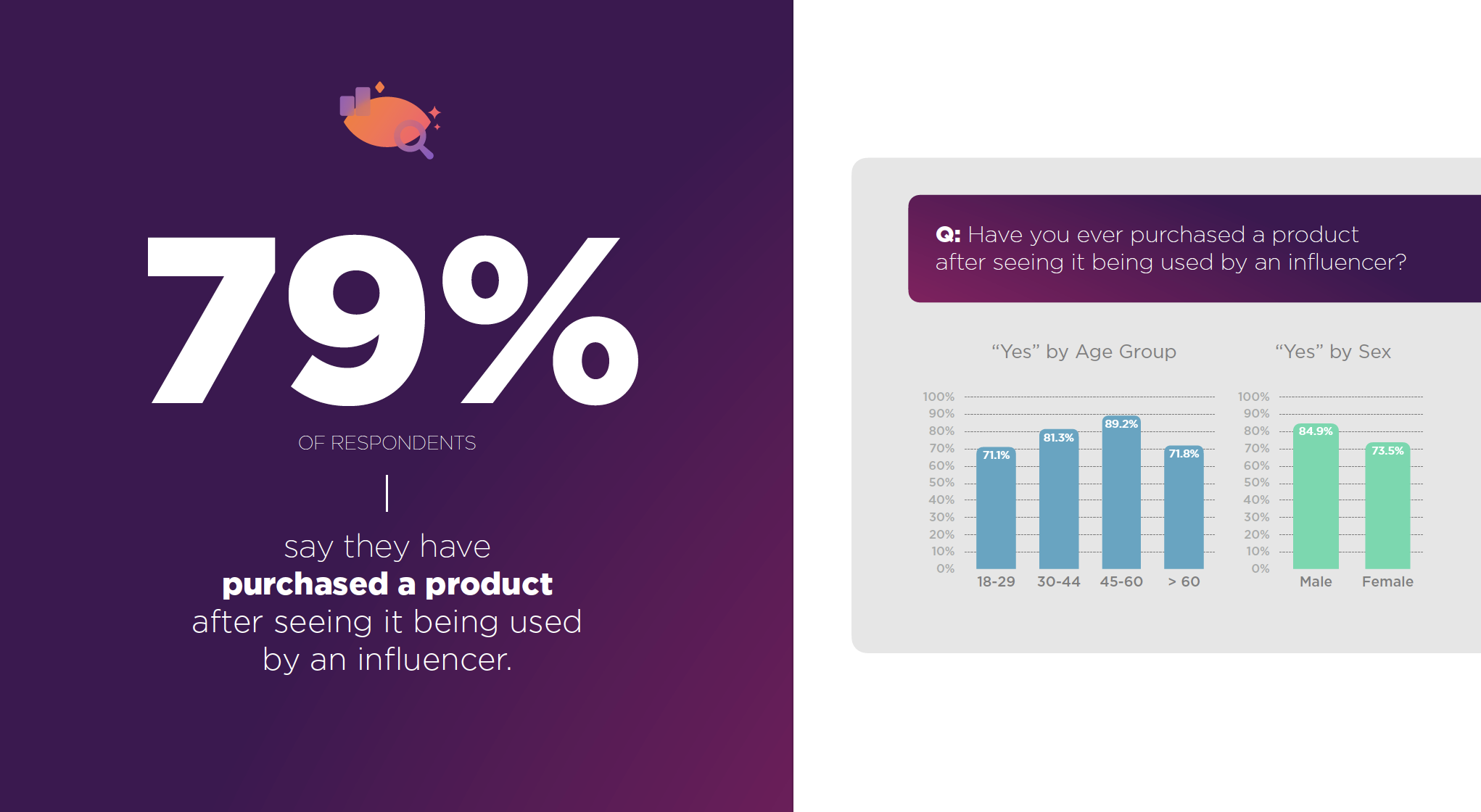Influencers are an integral part of the online space, creating communities, working with brands to showcase products and forming human connections online. Influencer culture shapes our everyday norms, from shopping habits to trends to beliefs to lifestyles.
In our 2025 Trust in Influencer Marketing report, we surveyed 1,200 American consumers to see how impactful influencer marketing was in their daily purchases. The give-and-take between influencers and their followers is stronger than ever. Influencers shape what people buy and the trends they follow, while people turn to influencers for recommendations and lifestyle tips. This has a big impact on what people buy: 79% of people said they bought a product after seeing an influencer use it. This proves how important influencers are in any solid marketing strategy.

The report has more interesting findings. 77% of the people we surveyed find influencer content more interesting than your regular, scripted ads. Plus, 85% of people trust posts from influencers more than those from famous TV, film, or sports stars, up from 61% in 2024. Being authentic in marketing matters. Influencers sharing their personal experiences come across as more trustworthy and believable.
That trust translates into sales. Influencers can talk about a makeup product, causing it to be sold out everywhere. The power of influencer culture is no joke, and it’s here to stay.
Influencers vs. celebrities
Influencers have become digital celebrities but differ quite a bit from TV, film and other celebrities. Because influencers have grown their audience, creating connections and trust, their followers are more apt to purchase based on what an influencer recommends versus a big celebrity. The Trust in Influencer Marketing report found that 61% of respondents trust a sponsored post from an influencer more than a traditional celebrity endorsement, highlighting the shift in trust toward influencers.
While a popular actor or singer may influence, their impact is much less compared with large influencers who have become celebrities in their own right.
Influencers are often invited to events that normally were only shared with traditional celebrities. They’ve even become the face of major sporting events or interviewers at awards ceremonies. Brands are seeing the true influence that influencers can have and how powerful they can be.
How influencers impact society
Influencer culture has had a profound impact on various aspects of society:
Trends
Influencers often set or popularize trends in fashion, beauty, fitness, food, and more. Their followers look to them for the latest styles, products, or practices, leading to viral trends that can spread globally.
Lifestyles
Influencers often share their daily routines, diets, workout regimens, and personal experiences, influencing their followers’ lifestyles. For instance, a health and fitness influencer may inspire followers to adopt healthier eating habits or start a new fitness routine.
Consumer habits
Influencers play a significant role in shaping consumer habits. They often promote products or brands to their followers, influencing their purchasing decisions. This is why influencer marketing has become a powerful tool for businesses. Studies have shown that consumers often trust recommendations from influencers as much as, or even more than, those from friends or family.
Society
On a broader scale, influencer culture has impacted societal norms and expectations. It has contributed to the “selfie” culture and the emphasis on personal branding. It has also sparked conversations about authenticity, as some influencers have been criticized for promoting unrealistic standards or lifestyles.
Mental health
The influencer culture has also impacted mental health, with issues like the fear of missing out (FOMO), social media addiction, and lowered self-esteem linked to the constant consumption of picture-perfect lifestyles often portrayed by influencers.
On the other hand, mental health advocates have emerged on social media to offer communities to people with the same challenges. Influencers can create supportive online communities where people feel understood and less alone. These communities can be especially beneficial for individuals dealing with mental health issues who may not have access to such support in their offline lives.
Economy
The rise of influencers has also created new economic opportunities. Influencers can monetize their platforms through brand partnerships, sponsored content, and merchandise, contributing to the gig economy.
While influencer culture has its positives, it’s also important to be mindful of its potential downsides, such as promoting unrealistic standards, consumerism, and the potential for misinformation.
Predicted growth and diversification
Influencer culture is expected to continue to grow and change. For example, TikTok took off during the pandemic in 2020 and continues to be one of the fastest platforms to grow on for influencers. In 2023 alone, TikTok reached 1.92 billion users. You never know when the newest app will come out or change to the current significant platforms (Instagram, TikTok and YouTube) that could change the influencer game entirely.
AI will continue to grow and enhance influencer marketing as we know it. The ability to use AI for content creation, ideation, analytics and so much more will continue to grow as the AI capability grows. This will be integral for both influencers and brands working with influencers.
Influencer culture will continue to evolve and change over the years, but it’s not going anywhere anytime soon. For now, keep an eye on AI and how that will shift influencer marketing as we know it.
Influencers:
Looking to partner with industry-leading brands? Create your free profile today.
Marketers:
The world’s biggest brands trust IZEA. Find which of our self-serve marketing tools or full-service influencer marketing solutions are right for you.
IZEA MANAGED SERVICES
Strategy and execution from the company that launched the industry.

IZEA MANAGED SERVICES
Strategy and execution from the company that launched the industry.

IZEA MANAGED SERVICES
Strategy and execution from the company that launched the industry.
IZEA MANAGED SERVICES
Strategy and execution from the company that launched the industry.








